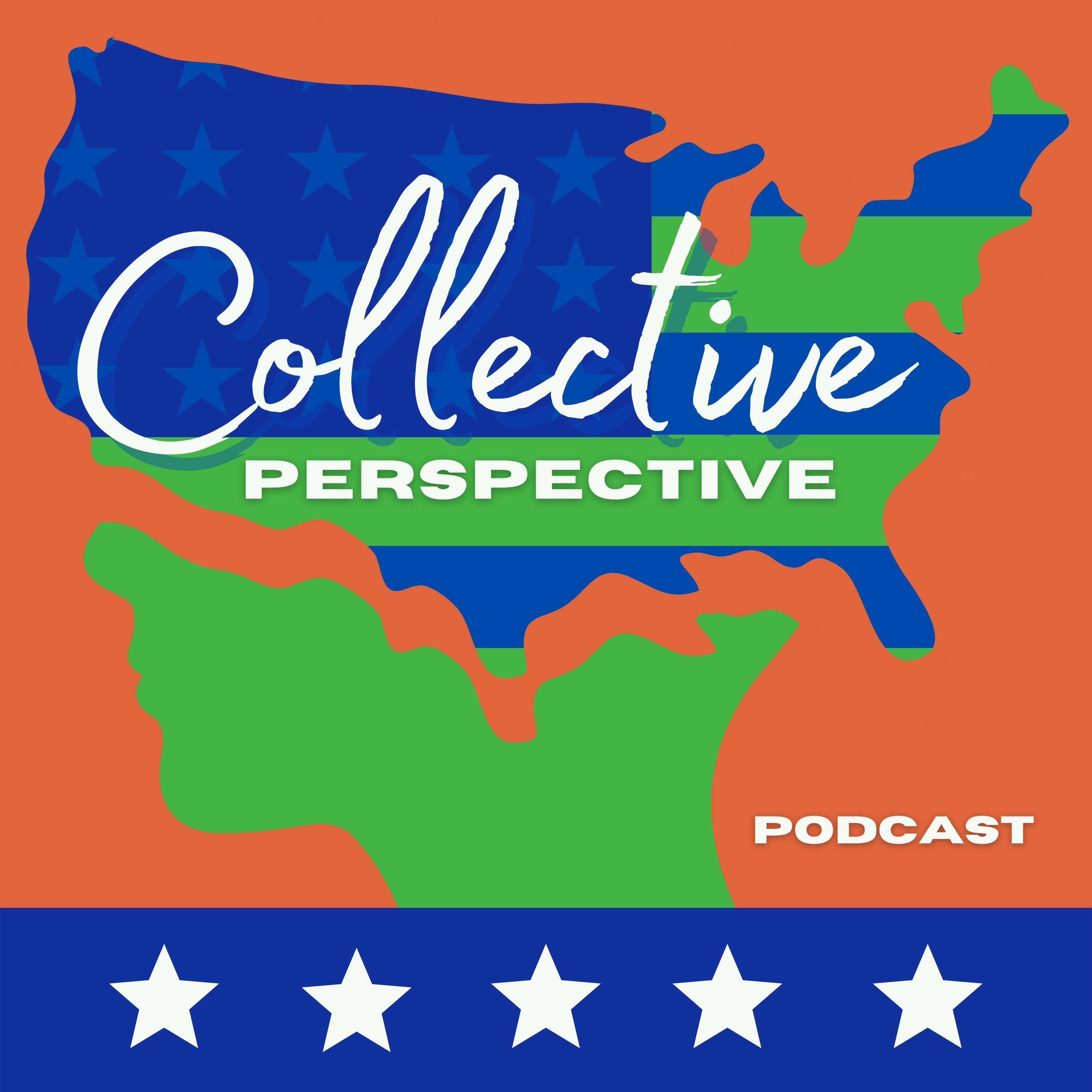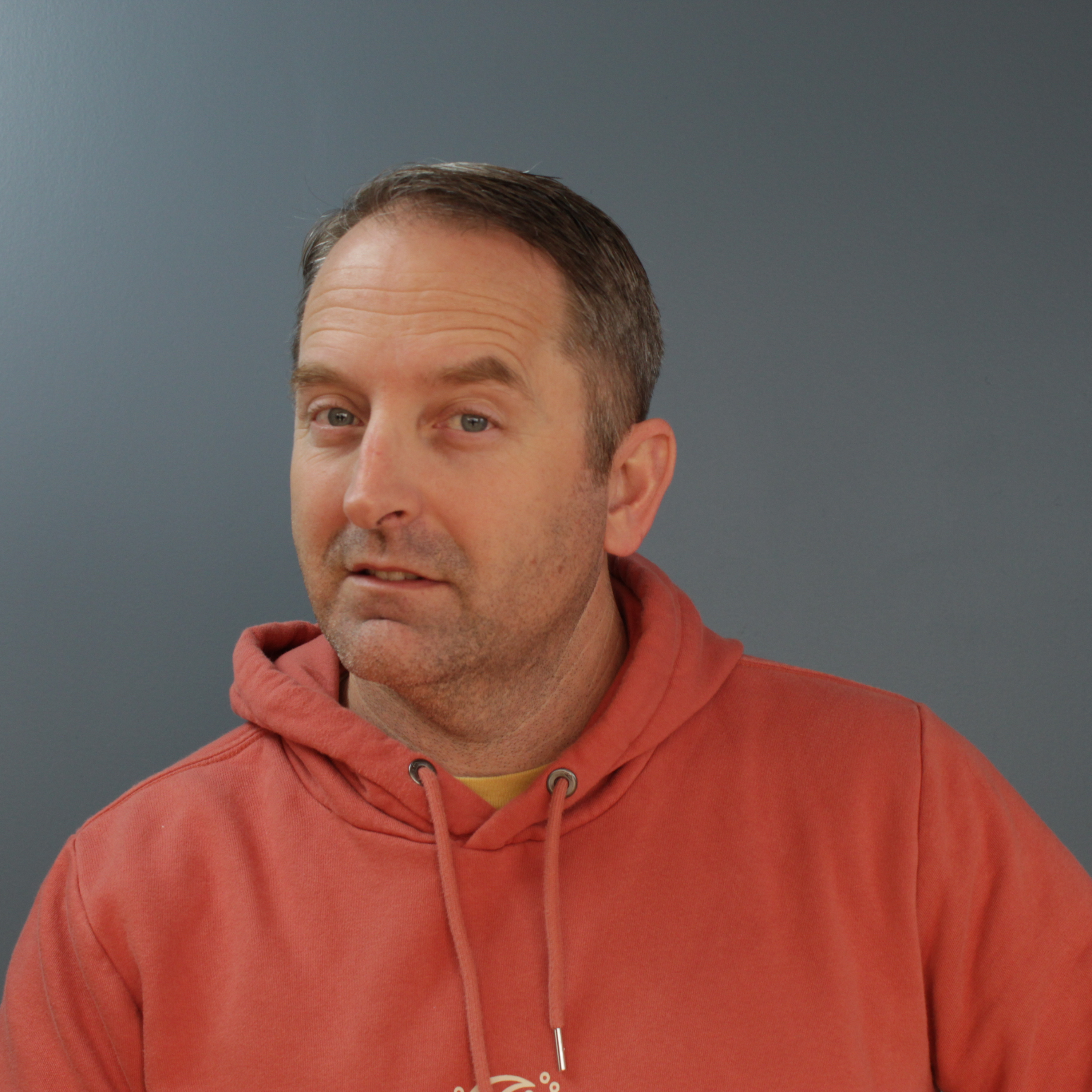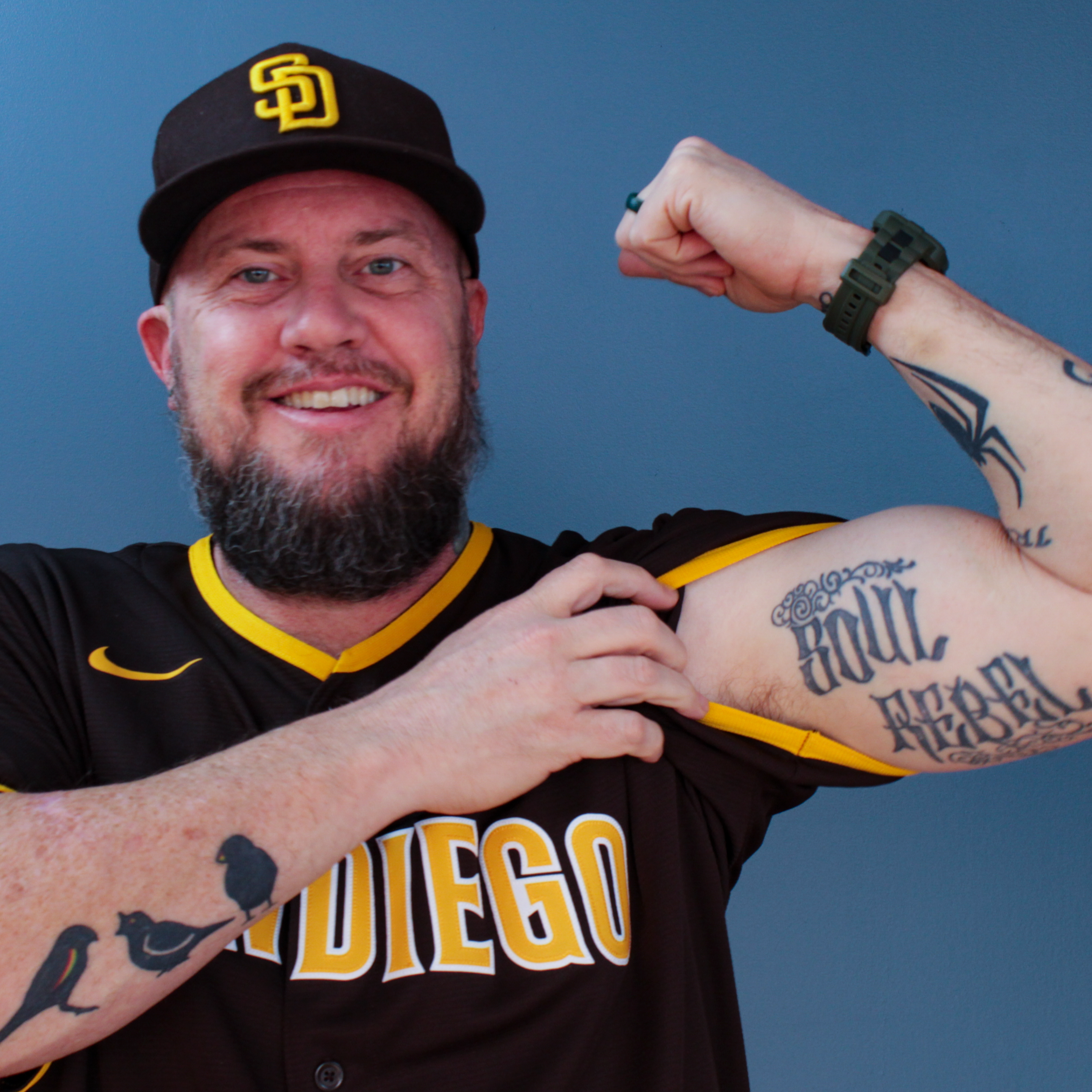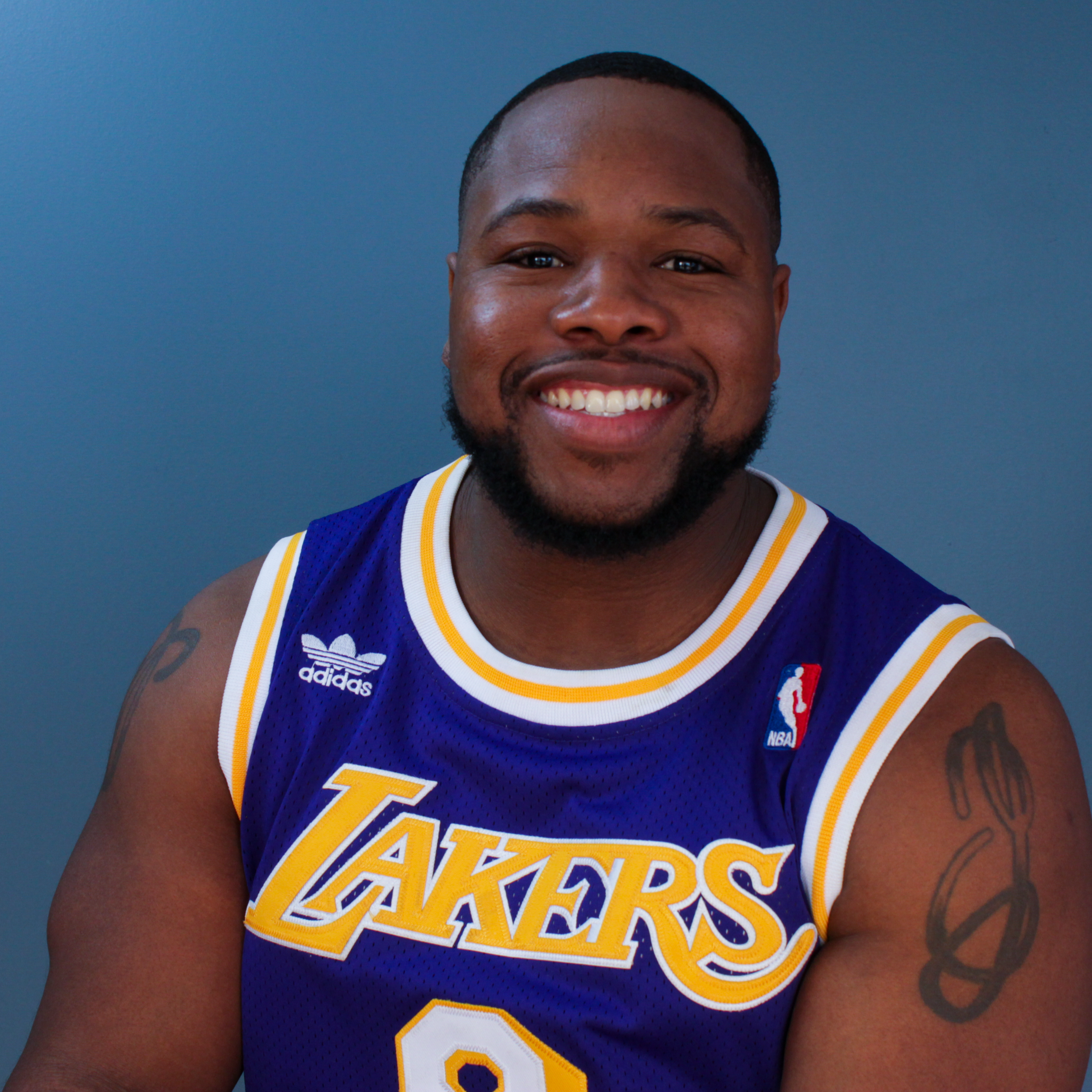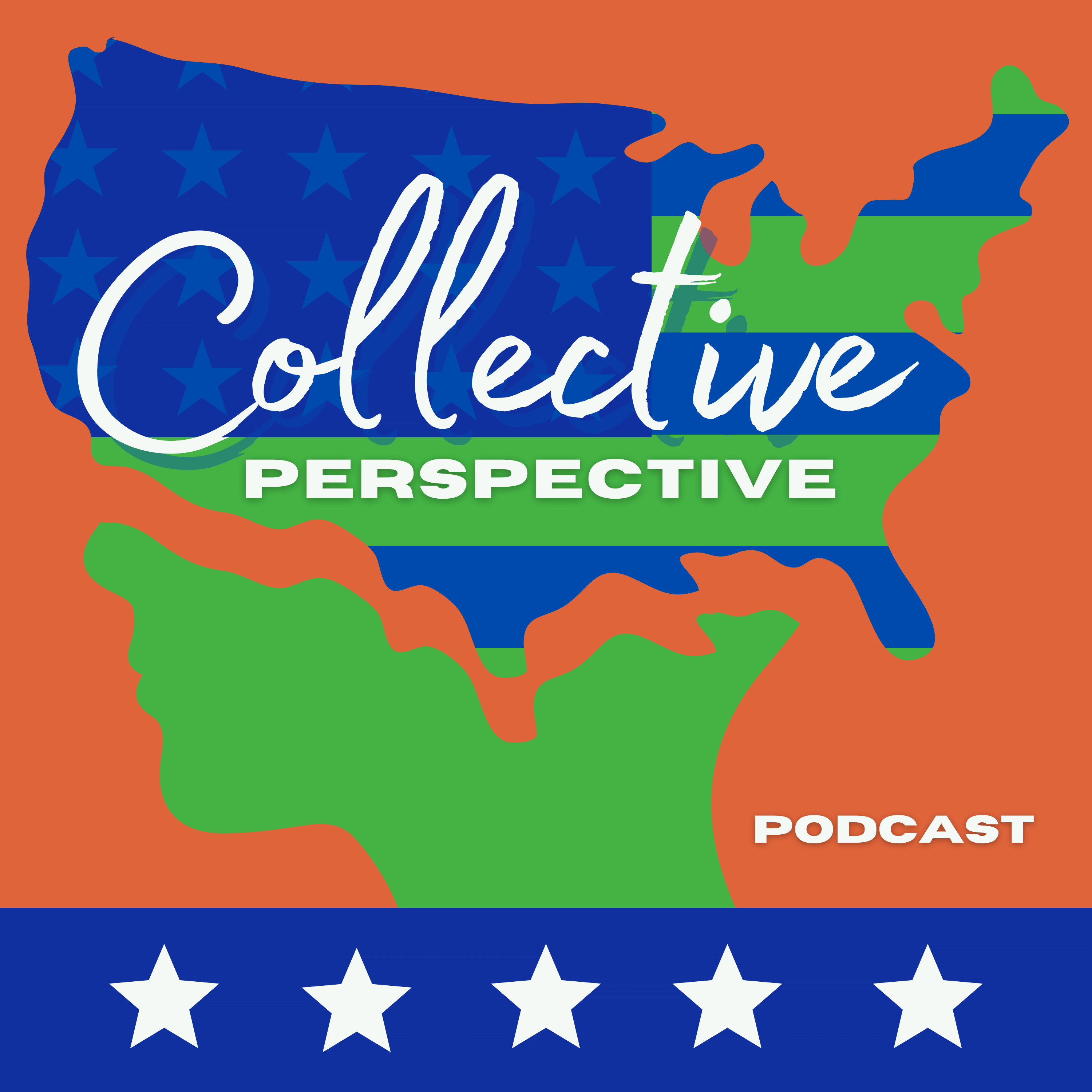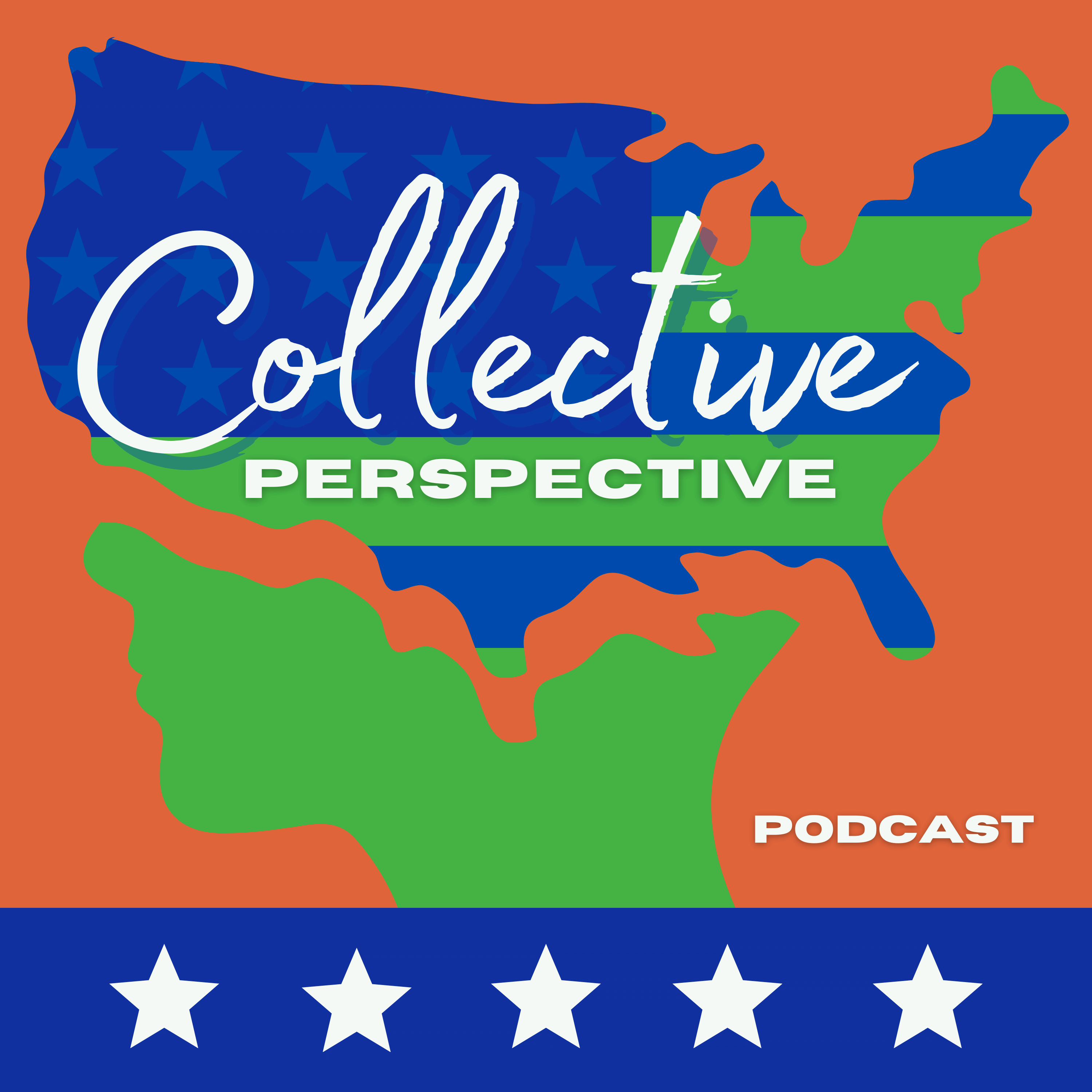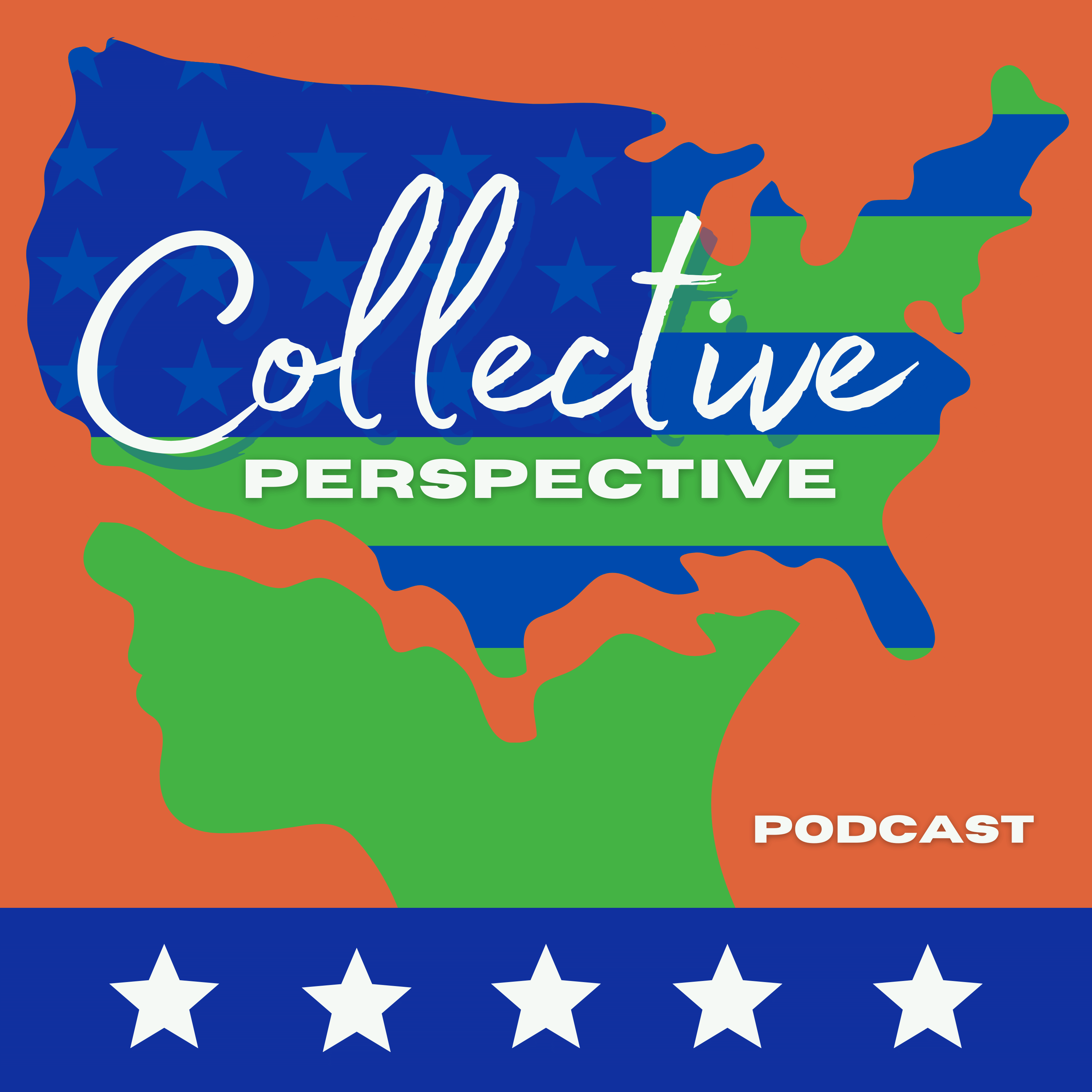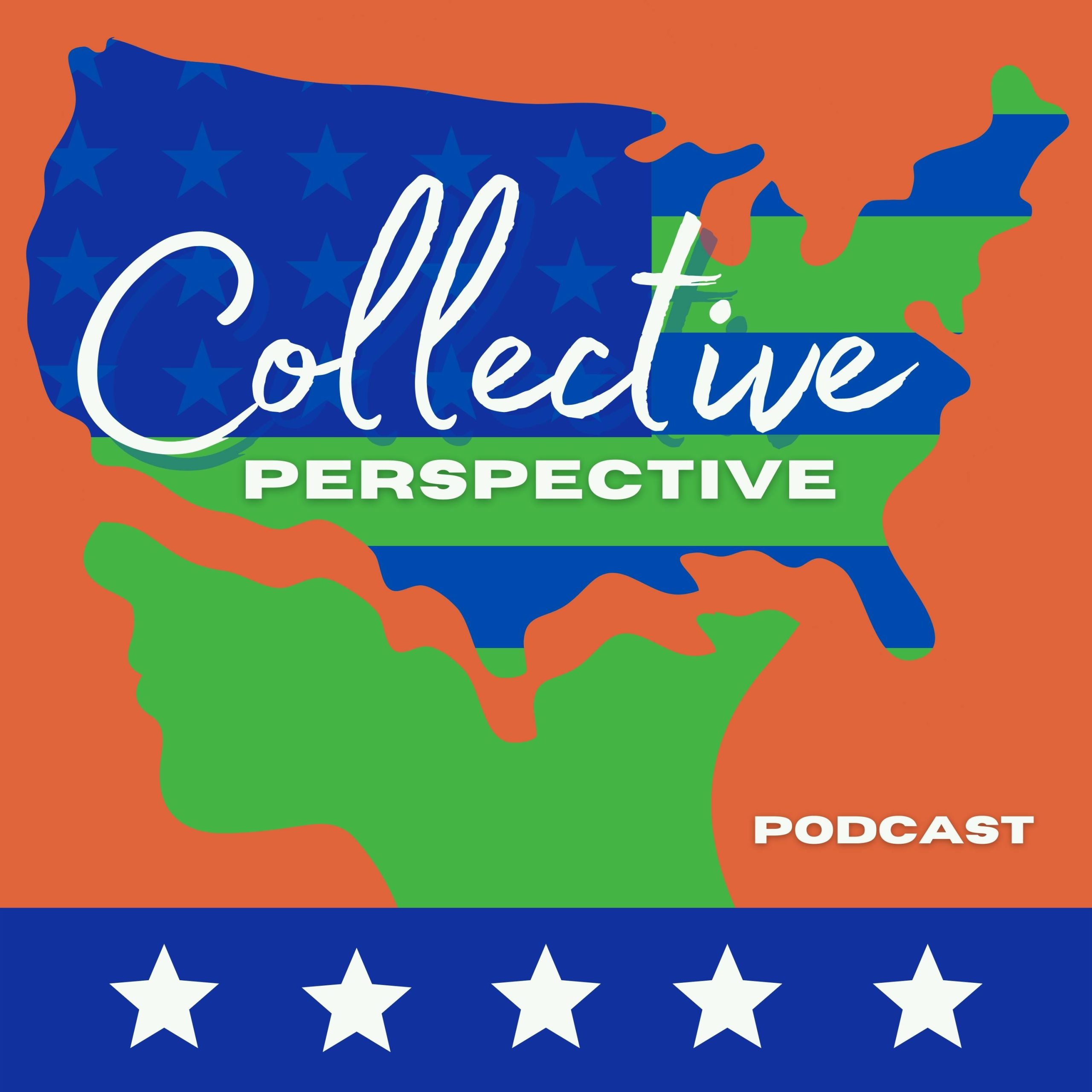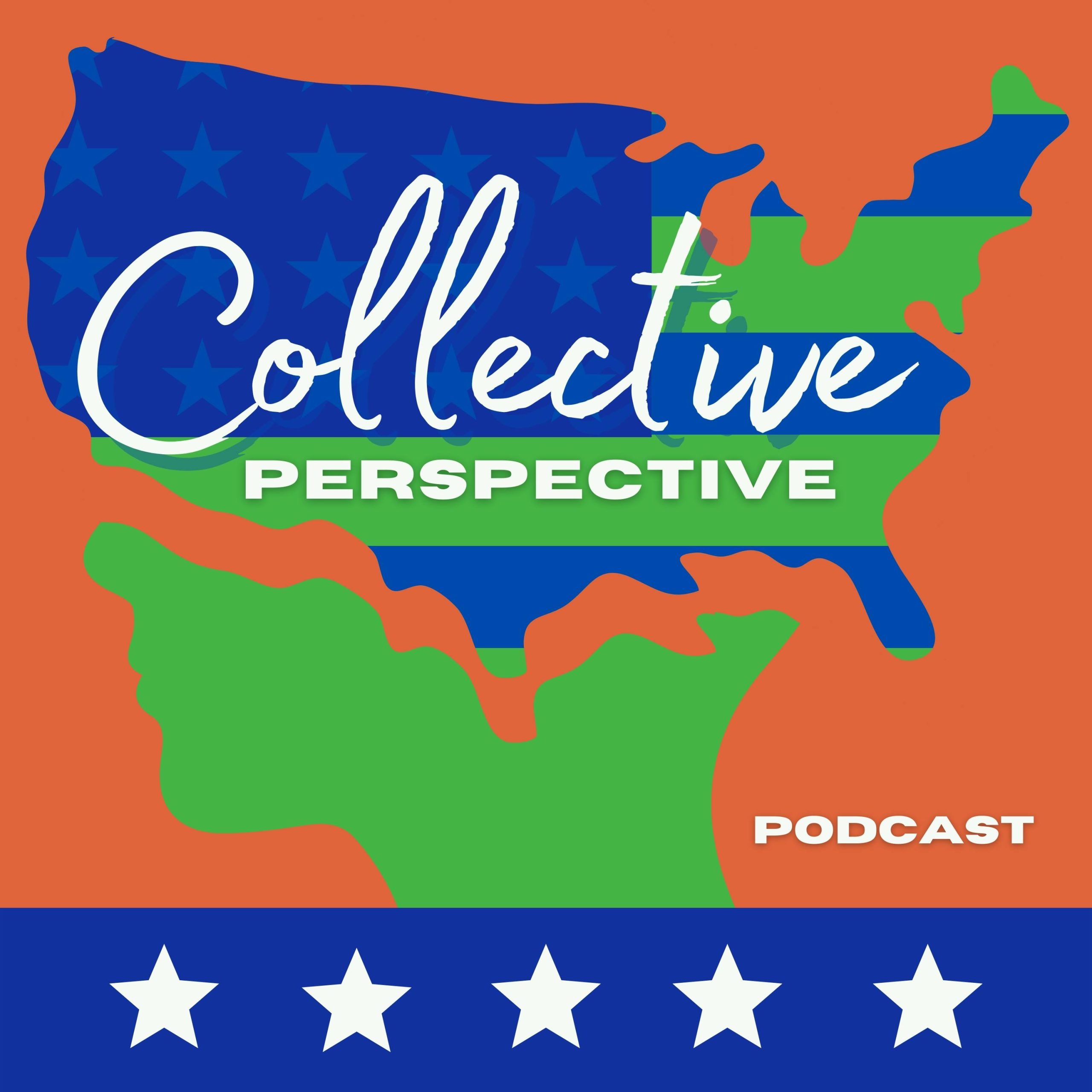Episode Transcript
Hey everybody, welcome back to The Collector Perspective. This is season four. This season we're focusing on what makes America stronger, starting with our local community. We're creating a digital footprint by shining a spotlight on the amazing work of organizations and non profits making a real difference in North Florida.
And who knows, every once in a while we might toss in a controversial topic just to keep you on your toes. Like, do you actually need to use your turn signal while driving, or is that just a suggestion? Tune in as we highlight those billboards. Hey, everybody. Welcome back to the collective perspective podcast.
This is Jeff. And today I have joining me, Travis. Hey, good evening, everybody. And Mr. Jawad. What's up everybody. And we have a very special guest today. It's our first legend, Jameel Johnson, also known as J Dash. Hey, somebody put in some applause in the background. J Dash is a multi platinum artist whose innovative sound and his chart popping Chart topping hit, The WAP, Jay Dash has not only achieved extraordinary success in business and in music, but also has dedicated himself to making a positive impact on the community.
That's where this podcast and this season is going, and welcome to Season 4, by the way. With a career that bridges artistry and philanthropy, he brings a unique perspective on power of music to inspire and uplift, and we're excited to dive into this journey, his achievements, and the way he's giving back to the community.
It's remarkable. How does that weigh on you? I appreciate it. I forgot who you were talking about halfway through. I was like, that guy sounds amazing. Who is that guy? Yeah. Who is this guy? So, hey man, welcome. The great Chay Dash. Thank you. Thank you. I appreciate you all for having me, man. Thank you so much.
Can you tell us about your music journey, your inspirations and how you started? That is a great question. My journey, uh, is pretty long. Started out with, uh, me learning how to play piano at like five years old. I started playing by ear. Mom put me in lessons. By 10, 11 years old, I was playing in bands. I was playing in blues bands, actually, which was the first genre I learned was, was blues music didn't necessarily come from a musical family per se.
Uh, and so my musical discovery was like all over the place. I was taking in every genre and playing whatever I was playing in bars at like 11, 12 years old, went to Memphis and played in the international blues and jazz competition in Memphis, Tennessee on Beale street. I met some blues legends out there, played with some great guys.
Yeah, started a music production company at 19 years old. The rest is history, man. I'm sorry, where were you born and raised? Oh, Jacksonville, Florida, baby. Oh, okay. Wow. Yeah, that's, uh, one of the only misfortunate things about him. He's a Jaguar fan. Oh, come on. This year's not looking too hot for him, unfortunately.
You know. I'm a Jaguar fan. We're gonna, we're gonna ride for him. Exactly, exactly. I'm in it to win. Hey man, we all love each other, just not our football teams. It happens. It's all right. I'm a Redskins fan. Wait, what are they this year? This year. It's been a minute since I've seen a season like this, so let me, let me relish in it a little bit.
Hey man. It like your boss. What have you done for me lately? Right. Can you tell us a little bit about key turning points or milestones in your career? You know, that's a great question, asking about key points and milestones, because there's two ways to answer that question. You can either answer it like, this is the one thing that happened and it changed my whole career.
The reality of the situation is the preparation for things happening is the most important part. So it's the, those practice moments. It's the, the everyday grind of it kind of takes that that's the most important part. I can't think of a few moments that were like. eye opening or mind exploding for me.
And one, and they all generally revolve around learning about new options. So anytime I learn that there are more things that are happening, I'm just like, my mind explodes. So one of them was after I started Jack's Beat Battle in Jacksonville. I went to Anaheim, California, which is where the headquarters of NAMM, NAMM is the National Association of Music Merchants.
Every year they do this huge conference in Anaheim, California. And then I went out to actually Carlsbad, which is where Yamaha is headquartered, met with a friend who was the head of corporate social responsibility at the time. His name is Dave Jewel. And I told Dave what I was doing about with Jack's Beat Battle.
He said, man, you would be really good on this fly in that we do every year. And we go to DC and, uh, you know, we meet with our congressmen and senators and talk about music education. So that was a pivotal moment for me because one, I didn't know about all the options in terms of being able to advocate for the thing I was passionate about.
It changed like how I networked. It changed. How I viewed, how people, uh, make things happen and how change happens across the country. So that was mind exploding for me. I have to say one of the first big breaks that I saw and just recently that you posted something that your sister had, your show with Lil Wayne and Fabulous.
Tell us about that. That was, uh, my first. I think as an artist, not just kind of playing in a band for other people, but me as an artist performing, my first show was in front of 20, 000 people opening for Lil Wayne and Fabulous at the Steven C. O'Connell Center at the University of Florida. I was going to school there.
At the time and a friend of mine here go gators go gators. You better know it go gators It's so nice. I had to make you say it twice So I had a friend of mine. He was booking the the talent and he was like, hey, man, you want to open up? I was like sure so I had me and one of the artists I uh worked with Opened up for Lil Wayne and Fabulous, man.
It was amazing. Thank God. There's no footage. Not everybody gets a good jumpstart like that, too. So that's a blessing right there, man. It's a blessing. Obviously for me, you one of the most important artists to come out of Jacksonville, Florida, man. And literally a musical pillar in the community. You've impacted so many people.
I mean, reaching platinum status, man, it really is monumental. It made a lot of people that couldn't see themselves going platinum. You made it possible to believe that it's possible personally. I'm grateful for that. But how did that impact you reaching multi platinum status? Wow. Well, great question.
First of all, I can't go without, uh, giving a shout out to the legends that came before me too, out of Duval, Van, 69 boys, you know, all them boys really let us know it was possible from the bangem to actually do that. And so, um, honestly, man, I am usually one to kind of like play humble and, you know, downplay the accomplishment, but it is a big deal.
Uh, it took a lot of hard work from a great team and I don't want to diminish any of that as well. Um, but you know, it feels good if I inspired one, one person to do something. As well. But for us, it was just working hard at the thing we were passionate about. That was great, man. It's a great question. I'm not, I don't know.
I've never really thought about it. You reach the achievement. It feels amazing. I salute you because you acknowledge our forefathers, the guys that kind of put their foot at footprint in the sand, they kind of found success in other areas. They actually moved away. And found success, but you actually, like, from the grassroot perspective, you started in Jacksonville, never left Jacksonville, and you actually became a platinum artist in Jacksonville.
A lot of these guys had to leave Jacksonville in order to be successful, and you did it yourself. Like literally you're right up there. You're right up there with Leonard Skinner. Yeah, Leonard Skinner, bro Limp Bizkit. Well, Limp Bizkit went Initially and went to North Carolina and other places, but he did it from Jacksonville from the muscle And you're being humble, of course, because you just are his songs.
I've heard it played doing line dancing in a country Are you only saying that cuz I'm wearing boots today And then I I remember texting Jay, like, bro, they got your song here. And then it's on TV and then it's on everywhere else. But breaking point for the song hit platinum, uh, I think we can, I definitely think Miley Cyrus, right?
Cause she did work song on YouTube and a white bunny outfit and his ratings went, started just recalculating, you know, you get so many listens a week. First it's thousands a week, and then it dwindles down to maybe 10. Then now it accelerated back up to thousands and thousands of views and, or listens throughout.
Well, the one thing I'll say from the. Like watching it from my perspective, the growth of the WAP has been a crazy rollercoaster, but not in the same sense that you're saying, like we went gold. Well, that's my perspective. Yeah, no, no, no, no, for real. I'm just going to give you the, the real, like we went, we went gold before Miley, right, and it took us probably well over a year, right.
But then Miley did, did the dance and we were platinum within a month. And so it definitely accelerated it. And then obviously that acceleration, that it lasts as long as the new cycle lasts. When did the song come out? Originally, what year? Cause, I mean, we're talking coming up on a decade, right? And it's still popular.
That's like, that's like the Beatles, man. You're like a Beatles. Look at you. Ringo Starr over there in Texas. Listen, man, yeah, it exploded, but I think social media, like every time a new one came out, it exploded there too. So when Vine came out, when Instagram started going video, when TikTok came out, like every time that happens, that's when it explodes again because people are making new content.
So when they say like content is king right now. So you, you notice a bump when a new platform comes out and more people, more creators are using it. Do you, you see that bump as well? Yeah. 100%. I can also see when it hits some countries. So it exploded in, in Asia early this year. So China was real, real big.
Japan, yeah, it exploded out there. And I'm just waiting to hit India. Because once that happens, it's out of here. That's incredible, man. Now, of course, you just, you didn't just stop there at the WAP. You've been putting out some great tracks and working on many projects. Great music. Thank you. And also, you have your own, like, music library.
People can buy your song, your tracks that you created. For sure. So, just, uh, the music entrepreneur. I created a BeatStars account. I need to do better by adding more stuff to it, man. It's been a while. I need to upload some new beats, for sure. Yeah, and we thank you so much, man. Uh, the first two seasons we used your, uh, one of your songs.
And then, uh, MGZ came in and said, Come on, man, let me write a song. We've been using that one, but He's got it. Jeezy's the Goat Man. Talk about the future of music projects and stuff. What are you currently working on? That is a great question. Kind of where I've been, I'll kind of start with where I've been, what I've been doing, and lead into kind of some of the stuff I'm working on.
So where I have been, I've been in like the sync space in the film space. So what that means is anytime people put music on TV and film, uh, I've been doing that kind of in the background, working with some shows on Netflix and Fox, and did the Teen Choice Awards. Castle on TNT, what is it, Murder in the First?
Man, it was a, it was a lot of different shows. And then we put some music in some film as well, did a film with Woody Harrelson and Owen Wilson. And then I scored a film called 83 days directed by AP Howell. And it's an amazing short film about George Stinney Jr. Who was the youngest person to be put to death by the electric chair, 14 years old black kid.
It was a heartbreaking story, but it was. Extremely fun to score. And we won an award for that. Just all, all over all platforms. That's great. All over. So that's kind of where I, that's kind of where I've been. Did work with the Spurs organization and did their theme song. And now I am, uh, on the board of a company here called the Long Center in Austin, Texas.
It's a performing arts center and we have the world's first 3d printed stage. Now we're doing a whole lot of content. Around the world's first 3d printed stage. I'm also selling the naming rights for those that want to buy it. So here we go. Can you tell us a little more about your vision for future, uh, for the future of your music and any, any.
plans for, for any upcoming releases? For sure. So we actually just released the first single off an artist named, uh, Angelica Ray out here in Austin, uh, produced about half her record that is dropping. The want to do is the first single just came out and then there's. Tons of other artists that we're, we're working with right now and we're building some indie artists.
Uh, we have a songwriter community out here called SongCraft where we actually help build songwriters in Austin, Texas. And then we're giving them a platform to, to release their music as well and more to come there. Uh, I can't actually give, give away what's happening behind the scenes there, but something cool is happening right now.
I did want to ask something about scoring of the TV shows, doing music for that. How is that different from your normal beats production or music production for what you would like put out? There's two different answers to that. When it comes to sync, a lot of times it's very much the same as beat production.
It's just learning how to format it, give the metadata correctly. So making sure that you put what kind of beat it is, the BPM, all of the info around the music and where it could go, and then getting it to the right music supervisor. And that's basically. 100 percent get a sync agent. That's what they do all day.
So they'll shop your music for you. But in terms of scoring film, that is a very different experience and one that I really enjoyed because it's controlling the emotion of a scene, right? Like music plays a really, really heavy part in how people feel. And so like, it was really, really fun to work with the director and talk about, Hey, what do we want people to feel in this scene?
in regards to what they're, they're seeing versus what they should be feeling and know what's coming. Controlling the emotions of a film is something I hadn't experienced before, and it was a blast. Some of my favorite artists have gone into that as well. Trent Reznor from Nine Inch Nails, he's scored a few movies, and I really, I really had a question about how that was different.
Thank you. That is interesting to know that there's a lot of thought that really goes into it on how to make the viewer of the film feel during that scene. That's pretty cool. George Lucas said sound is 60 percent of any movie. or any type of video. I believe that. Have y'all seen, there's like a little video clip of like two bees and they attack each, it looks like they're attacking each other cause there's like this super heavy music, like battle scene kind of music behind it, but then they changed the music to like this romantic music and it looks like the bees are kissing, same scene, exact same scene, but it just goes to show how important the music is to film.
My thought, what are your thoughts on collaborations? I know. Just being in the music community here in Jacksonville, you producing artists, uh, later you did, which I thought you did a phenomenal job on her album. You did a lot of great things. I mean, and, and it's, it's not just, just run of the mill production.
These are like really like some, some theatrical stuff that you do for artists and it's impactful. Literally when you work on something, it's like really a P a piece of like Picasso like kind of thing going on. But what are your thoughts? On your collaborations with other artists and potential new genres, like venturing out, man, I want to collaborate with everyone in every genre, honestly, as long as it makes me feel something.
And I think that's kind of where I'm at in my career right now is like, I really appreciate art and. Many forms, and I appreciate art when it makes me feel something, not art just for art's sake. So any artists that are still out there, like, actually making music for the sake of art, or for the sake of getting their story out, I want to work with you.
Period. And I, listening to your skill set as a, as a musician and as a producer, I don't think there's any limitations. I think you can do whatever you Whatever you can, whatever you can conjure up in your mind, I think that you can do it and do it great. I don't think there's any limitations with you. I think everybody, everybody needs to hear that.
That's true for absolutely everyone, you know. I usually just try to step into the doors that are open. I've just been fortunate enough to have a lot of open doors. So I've been able to work with, uh, artists like smash mouth, but then do artists like joy, Dennis, just amazing people, period. Right. Amazing artists, period.
And being able to work with talent that has made me feel something has been, that's what I chase. I remember you, me and Marcus and Jeremy all went out the member of smash. That was a long time ago. Shout out to our brother, Jeremy Mincey. Every woman at the table went, every woman in Hooters went to that table.
There was just like a magnet. That's funny that you bring that up. There's some shy little laughs there, but like it was, it was a good time. This season we're focusing on what makes America Stronger, and I firmly believe we can all agree that art makes America stronger in a lot of ways. It opens creativity for them to think outside of art.
Think outside of the box. Something out of the norm. Something abstract that nobody else is thinking, but hey, somebody thinks it's crazy, but then like ten years later, we all have it in our hand or, you know, we all have it to use. It also brings, uh, willpower and concentration and focus. You can't just sit there and play your music sloppy.
Like Sex Pistols, we're just out there just playing there. A lot of it is just the feeling and I also think that a perfect performance, what kind of makes it nice is if something's messed up, it's just kind of there and gone if it's a live event. But I don't think music's meant to be perfect either. No, it's never been.
As far as your community involvement, because I know this is something dear to your heart, you have a lot of friends that help you with this too, and a lot of doorways, and people want to listen to you. And specifically your work with the NAMM Foundation, to be an advocate for music in schools. Well, listen, man, you, you said something earlier about making America stronger.
And I think this all kind of ties together with the, with the work for the NAMM Foundation,
In the human experience, there are tons of things that we are divided by, right? And we, they're all coming to the forefront right now. We are quick to talk about all the things that make us different. But one thing that kind of makes us all the same is art and music, right? And access to good arts and music.
And you don't, tend to ask people, like, do you like music? You ask, what kind of music do you like? And just that simple thought, that simple question of how powerful music is, it, there are studies out there, which the NAMM Foundation is a great resource to actually see the data and the research around kids, test scores increase.
with access to the arts programs. And that's anybody. It makes you think differently. It makes you test differently. It's why we focus on children having access to music. That's why I go to DC every year. Uh, it's why I'm involved in the community to make sure everybody has access to good technology and to arts and education.
It's very important. If you haven't heard, there's an app called make music count. And it's founded by a guy named Marcus in Atlanta. He was actually on a show called Game Time with Shaquille O'Neal and Big Boy was on the show and they were talking about this app. Make Music Count is incredible because it teaches kids how to do math better by learning scales on the piano.
It treats it almost as a reward system for doing their math problems. They get to play songs that they like. So they're playing songs from young thug and, you know, any, whatever artists that they're into, they can play songs by them, but it's at the same time, it's teaching them things like, Hey, C plus one half is what?
C sharp. And so they're starting to learn fractions and it goes everything from like simple addition and subtraction to, you know, calculus. But using the piano. How important is technology in making music education accessible to these kids? Not just the apps like that, the scales for math, but apps in general to really get that education out there to everybody.
That is an amazing question, I'll tell you why. Because I'm like 50 50 on the fence. There is something about having like an instrument in your hand. And we're either working with it by yourself or with some kind of an instructor and doing that live. There is something about that that is like, you cannot replace, right.
But when you talk about accessibility and. using the tools that everybody pretty much has. Um, you have a phone in your hand or you might have an iPad or a tablet. Like it gives people the accessibility that they need to actually start learning early. One of the other things I'm involved with, especially here in the city of Austin is I worked with the city on closing the digital divide.
And I don't know how much y'all talk about the digital divide, but there are Places still, it's hard for people to believe that don't have access to laptops and internet where they live. And so when COVID hit, it opened everybody's eyes to the fact that all of school was online everywhere, like instantly.
And the schools were great about, hey, we're going to provide laptops to people, but they didn't necessarily think about the fact that this kid can open his laptop at home, but they have no internet here. It's an internet desert. And so how are they going to be able to compete? And then all of a sudden for a couple of years, there were a whole bunch of kids that got left behind.
Right? Because they, they might have spotty internet, but it's spotty. And so they're not catching all of the lesson or they just become bored. Right? It really highlighted a problem that we've been trying to figure out, but more than anything, it just highlighted that everybody needs access to high quality internet, as well as devices.
So I say all that to say, technology is extremely important, especially now when it comes to learning anything, including music. It really helps accelerate people. Like if you really know how to use YouTube university, you can go figure out whatever you want to figure out now. Everything's out there for you, but access to that technology and access to equipment is important.
So we're trying to make sure that's ubiquitous and accessible to everyone. Now, I do like that, that that was something that I wasn't aware of. I knew the idea of getting the laptops and the computers to the kids that were in school during that time. But that was something that I didn't even think about until you just said it was, uh, access to.
High quality internet, so they can actually use that device where they are. And it seems that we've really progressed quite a bit over the last two to three years, especially with Elon Musk and that Starlink being able to get internet in remote places where there is no connection anywhere else. Is there any way to maybe get the word out?
For that, is that something that maybe Elon or the, the school system might be able to help with, uh, procuring star links for those areas that you say are, what would you say? Internet desert. I think it's something that most city organizations. Our city governments are thinking about now, but it really is a case by case basis, right?
On what they will have access to, because we can solve the problem here in Austin, but you might have different problems in Jacksonville or in Atlanta, really. And shout out to Ro Khanna. who is a, uh, a senator that wrote the book on this, basically. And he's out of Silicon Valley and is helping, I think, the world understand faster how important this is.
Yeah, it really is a case by case thing. I think Starlink is something that's being looked at, but I think that there are other options in terms of running cables through the ground, print satellite locations, how we share internet. Those conversations are happening. But we move at the speed of bureaucracy in America, so we'll see how this goes.
And that goes very slow. Can you talk to us some more about the NAMM Foundation? What involvement you have with them? I see that you do a lot of stuff with them, but I'm not going to take your word for it. Yeah, for sure. So I work a lot with the NAMM Foundation, specifically advocating for music education.
I work with them. They bring me out to D. C. Almost every year. And we spend a few days on the hill learning about issues. And we've been doing this since the Obama administration. So talking about every student succeeds act, making sure that that got funded when stuff like that passes. It's funded at 0.
And basically everybody says, yes, we'll do it, but that doesn't actually mean that they'll put up the money for it. And so it took, I think, four years for us to get 1. 6 billion. And that's from zero. And that sounds like a lot of money and it is. And it came at like, with great work from a lot of great people in the music products industry.
That's a drop in the bucket, comparatively, and so we want to make sure that we continue to push and make sure every kid has access to a quality education that includes arts and music. But that's the work I do with the NAMM Foundation. What were you saying, Travis? I was just saying, your voice tails off, you're talking very, you're talking very low.
We hear you good over here, but towards the end, you're kind of like I'm looking at my meter, and my meter is pretty hot. You kind of tumble, and you're kind of I do mumble sometimes, so laughter I edit my own voice. So I know I try to, uh, like tonight I'm trying to talk louder because I feel like I don't talk loud enough.
This is NPR, National Public Radio. I'll make you sound like a woman. Thanks. Wow. It's possible. Literally. Literally. Right. He's gonna, he's gonna turn everybody else's volume down. That's true. Shout out to AI changing everybody's voices. What do you think, what do y'all think is gonna happen now that you can like, You can make anybody say anything.
What do you think that's gonna do to the world? I, uh, what do I think that's gonna do to the world? I think those that are in control of it are, have the potential to do a lot of damage. It depends on their motives though, but I think the AI like that, it's very powerful. I've seen what, what some of it can do and it, It's uncanny at how good some of these responses come out and how well they can mimic your voice with just a little, a couple of tidbits from what you're saying.
Exactly. Well, that's the new, the new Apple app. I don't know if you know this, but it has a thing that you can go through where it recognizes your voice. So now your voice is answering someone that's calling like, sorry, I'm not. AI is your voice to answer questions or to, to use it. That's terrifying. Try it.
Yeah, I was like, I was starting to do it and I'm like, wait a minute. You're not going to get my voice like that. It's like 150 something questions that you go through on the new iPhone update. Wow. So you're saying you didn't approve this transaction for 15, 000. It basically allows you to say a sentence or a paragraph, and then somebody gets to hear your voice.
Say it, even though it's not you actually saying it. Well, I, I, I know just. From social media itself, uh, perception is reality. A lot of people live their lives through perception. Um, they, they live their lives through their avatar or through their social media identity. And they really neglect or, you know, kind of sidestep or didn't, you know, Pretend that their real life is like a by product of what they've created in this virtual world.
And that Crazy, man. And like, this stuff is indistinguishable from reality. Which leads to my next question is, like, with everything else. Once everybody knows it exists and can do it. Yeah. They just stop believing it. So do you think people would just stop believing everything? Like, I don't trust the video.
I don't trust the audio. Like, what becomes truth? So what's more likely to happen? Surrogates or Ready Player One? I think both. It's tomato, tomato, it's apples, oranges. I think it's personal preference. I think that it, both of them are needed. I think that, and they both are going to be valid in the near future.
Right now I see it as a tool. So it allows you to reword things. You could add some type of emphasis into it. You get something at work, uh, email that kind of just. Makes you mad and you want to be professional because how many times have you written some, I know me, I write something, my boss can bring it to my boss.
He's like, yo, I wouldn't say that at all. I was like, I know I'm just writing it down to kind of get it just right. But you know how much time I'm wasting to do that now when I can just say, Hey, I want to stay professional. It's all about the prompt. So I want to stay professional and this is what I want to say.
And this is the response or whatever. And then let me know what, yep. Okay. You know what, I'm using AI exclusively to talk to my wife from now on.
Which response will not get me in trouble. I mean, it doesn't replace humans, but if you want it to come out better, I get accused for talking down to people sometimes, but I don't mean to. Now, is that online or is that in person? Sometimes both. Because I think that makes a big difference because in person, I think you're, this is something that I don't think AI can ever replace is that in person interaction where you can actually judge somebody's intentions.
by their body language, that's, that's almost becoming a lost art form with all the living in our social media or where online in the online world that you people don't really understand what body language is and how to interpret it unless they're actually out there talking to people in person on the daily.
Bro, our kids might not have any body language. That's yeah, I mean, just to go back to the topic we were talking about, uh, this is definitely going to affect our kids and I think we can tie into what we're talking about now and what we were talking about is, is that our kids are the future that are going to have to Navigate this new communication style.
Well, if we, uh, we can, right. I'm going down a path that I didn't think we wanted to go down. I'm sorry about that. No, I really am. I really am. Yeah. It's a rabbit hole thing, right? Yeah, no, not really. It was, it has to do with the online learning and what we were talking about and the accessibility and how.
When COVID came around, people were wearing masks and it actually stunted the development of speech in some of the kids. Yeah. Because they're not seeing people use their mouth to make these sounds. Wow. Like I said, that went the wrong way, but I think it's a good point on that. We're like, we were all ventriloquists.
Ventriloquist, uh, artists or something. And I think that goes to your, uh, J, J dash and, and the, and some of the apps and some of this music stuff, and that I understand why you say you're 50, 50 on it with, uh, education. Yes. It's a good way to get education out there, but there's something about actually picking up an instrument and playing it and seeing how it's played in person and mimicking it with your own hands and on the instrument, the technology and the apps.
Can't necessarily do that at this point. How important it was for me as a youth being with my instrument. I'm a drummer initially and how it, how important it was for me to interact the camaraderie with other musicians, seeing the beauty of playing one instrument and someone playing another one and watching this thing come together and become a song and reading, learning how to read music and everything.
So the next question for me was how impactful. music education on youth development and any success stories from your efforts, your advocacy efforts. Any stories from my advocacy efforts? Uh, well, first of all, I want to acknowledge what you said because I think it was a great question. Um, and a great segue, um, because there are entire platforms that are built it to be easier for us to make music a part.
Does that make sense? You as a drummer can be at your house with your electric drum kit and having a jam session with somebody in Berlin playing their guitar, which is amazing. That is an amazing feat of technology. But I think that, right, right. But they're figuring that out. And so it's like, music is meant to be shared.
Together. And there's something about like being in the room, like there's a feeling happening in the room that y'all are in right now that I don't get to participate in. Right. And that's something that I am missing. You see what I'm saying? And so like, it makes music special to be able to create it together.
So as a part of, you know, doing work with them, what we always do the week that we go to the Hills, we start out with a day of service. And so we'll go to a school in the area and we'll do everything from playing music. with kids, to fixing instruments, to like, just pouring into kids at the school, wherever we are, right?
And that means a lot. Like, it means something when you're there. You feel something when you're there. So you talk about stories from, from doing that. There's, there's tons of stories. There are kids that have had broken instruments for years. And then we swoop in because this is just a ton of, you know, People that make the instruments, right?
And they come and they just fix their instrument right there. And it means the world to these kids and seeing, uh, what it does for them and seeing what music does to impact their lives. It's indescribable, man. Like, yeah, you can't, you can't take that and put it on a podcast in a, in a two minute answer and think that it's going to mean something to somebody.
You have to be there. You have to see like human interaction again. You have to see like what it does for people. And I think what. The internet has done in a negative way has made us diminish our own importance as an individual. I think because the world has gotten smaller, I think we feel smaller as individuals.
And so I think that that diminishes the impact that we can have on people around us, which is why it's important that you, like, get out in your community and actually do something for someone. I think that that helps make. America better right now is actually dealing with real people getting out there and understanding the impact that you can have on somebody's life by just being their presence.
And so like the things that you have picked up over the years that you don't even think about may mean the world to somebody else. That's the reality. I think it's awesome because it changed my life. Like, it changed the trajectory of my life. You know, when I was growing up, and my dad in sports and life growing up around your brothers and everything.
But when I discovered the love of music, and then it was cultivated in school, and people poured into me as a youth, it changed the trajectory of my life. And it became something that I didn't, I, it was, it was, it became breathing to me. Music became like natural as breathing. I couldn't imagine my life away from it so much.
So I, God blessed me with a studio. He blessed me with this career. I've worked with like you, I've worked with, you know, real monumental artists and people. Is it better than sex? Um, it's a different language. Let me say, it's a different language and it doesn't let me down. Music has never let me down. It's always just been more like let her down.
It's never let me down. I mean, it's never betrayed me. Uh, it's never let me down. Music has always been this pure thing where I can go into this space and just be me, music, music has a way to tap into your emotion of, of the moment for you. And I think a lot of us, uh, I know I do. Music I use music as a release.
I listen to all types of music and some days I feel like, you know what, today I want to hear some Stevie Ray Vaughan. Some other days I want to listen to some different blues or some harder rock or some, let me listen to a few beats from somebody else. It can accentuate and help you get, it helps me get out of dark places sometimes when I put the right music on.
Stevie Ray Vaughan is awesome, bro. Oh, I love Stevie Ray Vaughan. Come on now, that's one of the first artists I ever played. Really? Man, you can't hustle music. You can't fake it. It's this thing that makes, it exposes you and it keeps you honest. You can't, you can't fake it. It's not like an avatar. It's not like social media.
It's You do music. It's, it's like this thing. It's just pure. It's, it is a language for sure. And I just praise God for you, man, for what you do with the youth, man. That is so, as a youth that it impacted me so greatly. What you're doing is so monumental, bro. It's unbelievably monumental what you're doing for the kids.
I appreciate that. AJ, we, we thank you for being on the show. You've come a long way. You started from zero. Some people don't start from zero. You were blessed on the way, in the right place at the right time, with the right talent and the right attitude, and just knowing you personally, I know a lot of your success is to do with your attitude and your personal drive, and it's Definitely notable, uh, in my life and it should be notable in everybody else that's a fan of yours, the blessing, knowing you, man, and having you as a brother.
Appreciate that, man. You too. Do you have any advice for any aspiring musicians and young artists? Play a lot. Suck. Be bad. It's okay, right? Grow with people. That is, that is the advice. Like all the other advice you're gonna get in your algorithm, it's gonna tell you all of the, the feel good platitudes of what, what you have to do.
But like biggest word of advice is be true to yourself. Make your sound. Don't try, don't try to sound like anybody else. Just make the things that make you feel something. And sometimes other people will feel that because we're all living a human experience. That's it. Be true to you. Push hard. Grind.
Don't try to skip the work. There is no skip. There's no fast track. Put your stuff out there. Make it content. Content. Be true to yourself. It's never been easier to get your stuff out there than it is now. Never. For sure. 100%. And it's okay. It's okay to fail. It's okay to stumble. It's okay. And I'm having this battle with my daughter right now with trying to get in school.
She was really depressed the other day talking about trying to get into colleges and she's like, I'm not going to get in. I was like, look. So Eddie, there's thousands of people right now in your position trying to get into colleges, and it's okay if you don't get in. What's the worst that could happen?
They say no, you'll get in somewhere, it's not that bad, and, but be true to yourself. It's all about what you do after the fact anyway, it's not what And if you made a mistake on something, what was it? Did you learn from it? Can you move past it? That's what I'm trying to teach her. For me, God'll put you in the room, right?
He'll put you in the room. He'll give you the opportunity, but your character and your humility will keep you in the room. And I think that that's why he's in the room, because he wants to help someone. And that's what God is all about, is helping people. Your gift was never for you. It is for someone else.
The tree only needs water, but the fruit itself is for someone else. The tree doesn't eat the fruit. And I think that God has blessed him to have such a large platform to impact so many people because he cares. He actually loves people and he wants to help people and bless people. That's why he's in the room.
And he's going to stay in that room and God is going to use him in a greater capacity because he's a blessing, not only to his community, but everyone he, everyone he touches. Wow. And I praise God for you. Pass the collection plate on that one. That was a sermon dog. I love that. I love that. You know, the fruit tree don't, they don't need the fruit.
The fruit is for someone else. Like our boy Jay is a tree, dude. Wow. It just needs the water. It never eats its own fruit. Come on. The tree never eats its own fruit. I need that on the shirt. I love that. And that's what you do, brother. AJ, how can we help your mission, your projects, or your music? Give us some plugs.
Uh, plugs. First of all, follow me on all social media, at TheRealJDash on everything. Also, I don't know if you knew, my father passed away a few years ago. We started a scholarship fund, and his name's The Melvin Johnson Scholarship Fund. If you're passionate about minority kids, learning business, and getting into college, Uh, we're here to support that.
So I'll send you a link. If you'd like to share that out, that'd be helpful as well. Support the NAMM Foundation and all the efforts to get kids access to quality music and music education across the world. Also support the Long Center. And everything that we're doing at the Long Center to make sure that the community out here has, uh, has some support.
Cool, man. Thank you for being on the show. Do you have any final remarks for everybody? Final comment? I appreciate y'all. I just want to thank you for continuing to, to put this content out there. It's important. It's important for people to hear things that will make America greater in a non biased way, or things that will help us all come together even we, even if we have differences of opinion, uh, it's important to learn how to have regular conversations and be okay with different points of view.
So thank y'all for having this platform and hosting me on it. I appreciate it. It's great to have you on our launch for that, uh, topic. Kind of deciding how we were going to progress with the show. And I don't see myself coming off of this topic. We might add other things to it, but we really want to know what really makes America stronger.
And it starts with people like Jay. Absolutely. And there's people like Jay that continue it on and it's just, I don't see a gray hair in the man's beard. So he's going to be around for a long time. What are you telling me, dude? I'm going to stay back here then. I ain't going to get too close.
All right, man. We love you, man. Um, thanks again.
